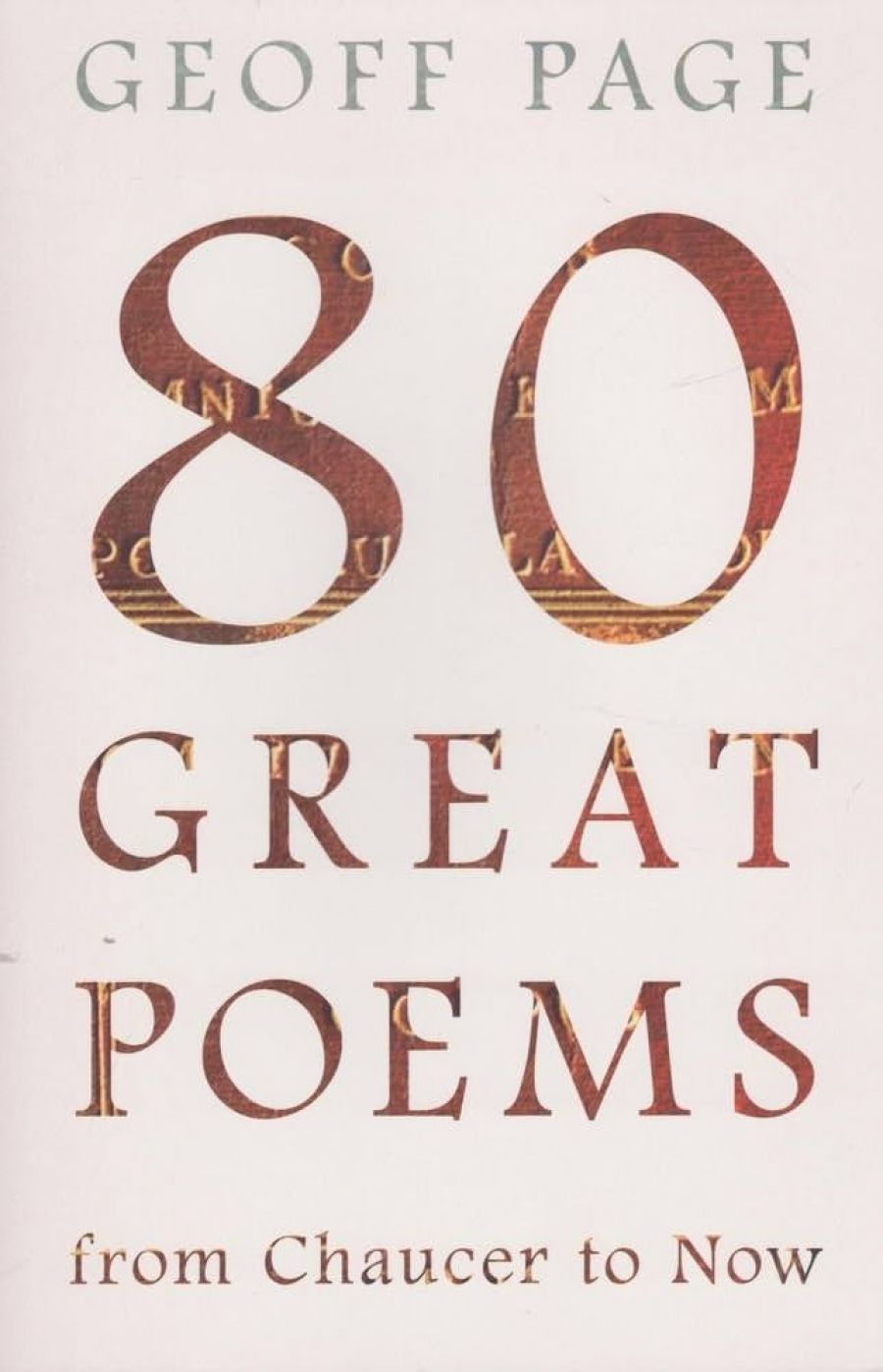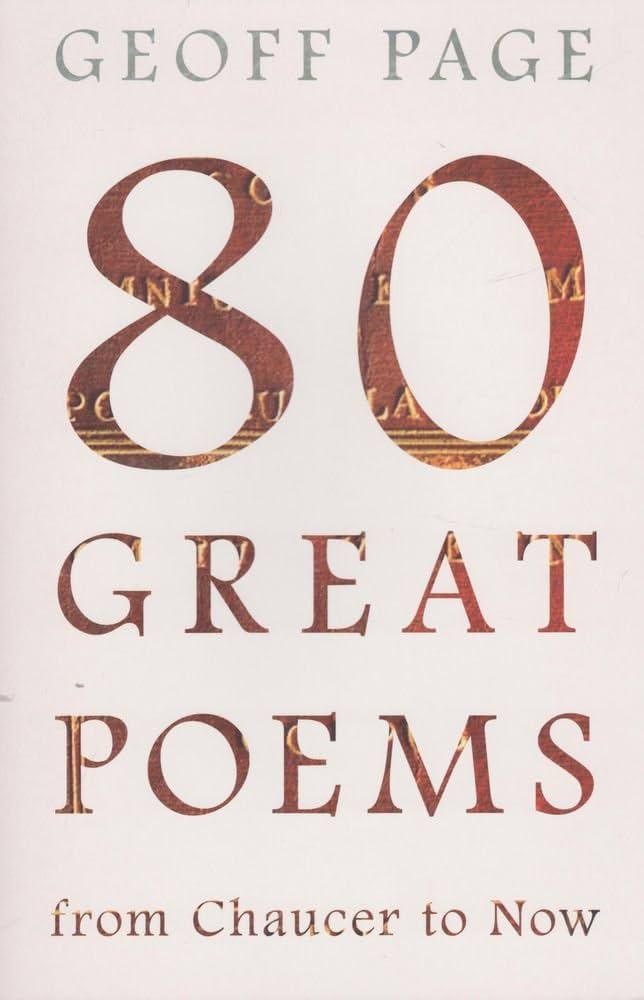
- Free Article: No
- Contents Category: Poetry
- Custom Article Title: Good old goodies
- Review Article: Yes
- Article Title: Good old goodies
- Online Only: No
- Custom Highlight Text:
Fancy an editor in this post-whatnot era using the word ‘great’ to describe the poems he publishes. Lord save us! It is almost as though recent decades hadn’t been, and we still wore the mild woolly clothing of the postwar years. But here is the Canberra poet and longtime schoolteacher Geoff Page offering us a high road through poetry in English: a series of touchstones, as our serious uncle Matthew Arnold might have said.
- Book 1 Title: 80 Great Poems
- Book 1 Subtitle: From Chaucer to now
- Book 1 Biblio: UNSW Press $34.95 pb, 335 pp, 0868409243
- Book 1 Cover Small (400 x 600):

- Book 1 Cover (800 x 1200):

Reputations swim past us, of course, floating on full-page interviews in the weekend papers, each account depending from the photograph of a smiling face. But they are gone tomorrow, like Stevenson’s little boats on the rapidly flowing river. Our age has become skilled in ways of detaching fame from achieved quality, as Andy Warhol memorably pointed out.
No matter how we pretend to be value-free about literature, about all the arts, we know perfectly well that some works are vastly better than most others: that they can be read in vastly more ways, rewardingly so. William Blake’s ‘London’ and Andrew Marvell’s ‘To His Coy Mistress’ are poems that are abidingly rich, not by any imagined conspiracy of sinister élitists. Of course, the changes that E.E. Kellett called The Whirligig of Taste, back in 1929, will continue in any foreseeable culture, but they do not abolish quality.
Page is troubled by the thin cultural gruel that he finds around him at present. After judging a youth poetry competition and finding the entries to be marked by ‘paucity’, he wrote that:
One hesitates to set teachers and parents a reading list because, ideally, they should devise it themselves from a wide reading of adult poetry (through time, space and different languages, via translation) … Students aged between 12 and 15 who are presented with anything less are being short-changed.
80 Great Poems is, whatever else, offered as a remedy for this situation in Australia. I use that last phrase because the later contents of this book are clearly slanted towards this country, beyond the mere fact of having been published here. In a way, this volume is two annotated anthologies: one of important poems, one per poet, from Chaucer and Dunbar to Larkin, Lowell, and Plath; the other of Australian poets, organised in the same way. For a coda to wag, Page has added a glossary of poetic terms. This glossary looks useful enough, although there could be confusion about ‘long vowels’, when set beside the entry on quantitative verse, and there are false emphases in the entries on lyric poetry and personification.
Those who review anthologies commonly dole out measures of praise and blame. Given the pattern of one piece per poet, there can be remarkably little to argue about in the first 260 pages or so of the book. There are many better Donne poems than ‘The Apparition’, I would say, and the mawkish sonnet ‘Bright Star’ does Keats little credit, when there were the great odes to choose among. (Look, dear reader, I have dared to use the adjective ‘great’.) As for omissions, I can only suggest Sir Walter Raleigh, D.H. Lawrence, Elizabeth Bishop, and Allen Curnow, along with Emily Brontë’s ‘Remembrance’. Robbie Burns might also come to mind. And the most obvious gap among famous, influential poems is Edward FitzGerald’s translation of ‘The Rubaiyat of Omar Khayyam’; of course, this is a longish poem, and material would have had to be excerpted from it, but this was done with Milton, Pope, Byron and Whitman.
Still, these are minor cavils. As for the last part of the book, one cannot say much with certainty about one’s juniors, except ‘Dunno’. Moreover, Christopher Ricks has testified to ‘the experienced conviction that most of us are not good at appreciating the poetry of those appreciably younger than we are’. As a social historian, I would note that the only Victorians present are John Shaw Neilson, C.J. Dennis, and Bruce Dawe. Beyond that, most of these poets have some kind of claim, and John Tranter is displayed with a particularly attractive poem, ‘North Light’.
Each piece in the book is accompanied by three or four pages of explication and background. These seem to be addressed to high school audiences, for whom they should be clear and useful enough. Admittedly, I am not always persuaded by Page’s exemplary scansions. But for me, the only moment of ideological offence is where he praises a Robert Gray poem for not being ‘your standard hand-wringing environmental poem about our wasteful society’. Where is he coming from here?
High school students, in particular, will draw benefit from the arrival of 80 Great Poems. I hope so, at any rate.


Comments powered by CComment